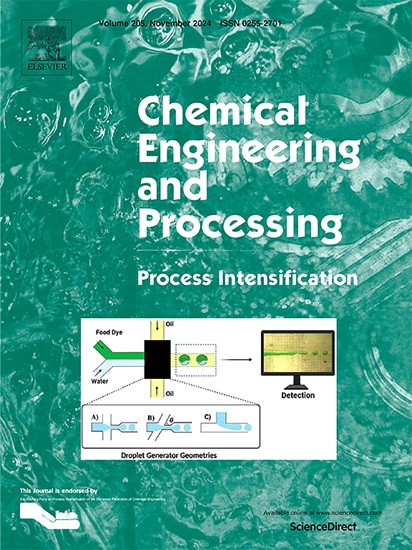Next-Gen Bioprocessing: Sustainable Scale-Up of Triple Algal Co-culture System
IF 3.9
3区 工程技术
Q3 ENERGY & FUELS
Chemical Engineering and Processing - Process Intensification
Pub Date : 2025-08-15
DOI:10.1016/j.cep.2025.110512
引用次数: 0
Abstract
In recent years, microalgae have attracted considerable interest because of their diverse uses in sustainable biotechnology. The role of microalgae in industrial biotechnology is steadily increasing; however, limitations (e.g. cost, operations and maintenance) encountered during scaling-up processes necessitate the development of more efficient methods. The co-culture approach offers numerous advantages, including enhanced productivity, sustainability, product diversity, cost-effective operations, and eco-friendly processing. In this study, a triple algal co-culture of Haematococcus pluvialis Chlorella vulgaris, and Spirulina platensis was scaled up in air-lift photobioreactors (ALPBRs) from 2 L to 8 L using constant power consumption per unit volume as the scale-up strategy. The results indicated that scaling-up increased productivity (approximately 1.3-fold increase), with significant improvements in production parameters observed in the 8 L ALPBR. Biomass productivity showed a 1.75-fold increase when scaling from 2 L to 8 L. Protein, chlorophyll and carotenoid productivities increased 1.5-fold, 1.2-fold, and 1.1-fold, respectively, compared to the 2 L ALPBR. These results demonstrate that the triple algal co-culture system enhances both energy and product efficiency, confirming the effectiveness of scale-up using a constant power consumption per unit volume strategy and highlighting its potential for more sustainable and efficient microalgal production processes through increased biomass and bioactive product yields.

新一代生物处理:三联藻共培养系统的可持续扩大
近年来,微藻因其在可持续生物技术中的多种用途而引起了人们的广泛关注。微藻在工业生物技术中的作用日益增强;然而,在扩大过程中遇到的限制(例如成本、操作和维护)需要开发更有效的方法。共同培养方法具有许多优点,包括提高生产率、可持续性、产品多样性、成本效益操作和环保处理。本研究以恒定单位体积耗电量为放大策略,将雨红球菌、寻常小球藻和螺旋藻在气升式光生物反应器(ALPBRs)中的三种藻类共培养从2 L扩大到8 L。结果表明,放大可以提高生产率(大约增加1.3倍),在8l ALPBR中观察到生产参数的显着改善。从2 L到8 L,生物量生产力提高了1.75倍,蛋白质、叶绿素和类胡萝卜素产量分别比2 L ALPBR提高了1.5倍、1.2倍和1.1倍。这些结果表明,三藻共培养系统提高了能源和产品效率,证实了使用单位体积恒定功率消耗策略扩大规模的有效性,并强调了其通过增加生物量和生物活性产品产量来实现更可持续和高效的微藻生产过程的潜力。
本文章由计算机程序翻译,如有差异,请以英文原文为准。
求助全文
约1分钟内获得全文
求助全文
来源期刊
CiteScore
7.80
自引率
9.30%
发文量
408
审稿时长
49 days
期刊介绍:
Chemical Engineering and Processing: Process Intensification is intended for practicing researchers in industry and academia, working in the field of Process Engineering and related to the subject of Process Intensification.Articles published in the Journal demonstrate how novel discoveries, developments and theories in the field of Process Engineering and in particular Process Intensification may be used for analysis and design of innovative equipment and processing methods with substantially improved sustainability, efficiency and environmental performance.

 求助内容:
求助内容: 应助结果提醒方式:
应助结果提醒方式:


